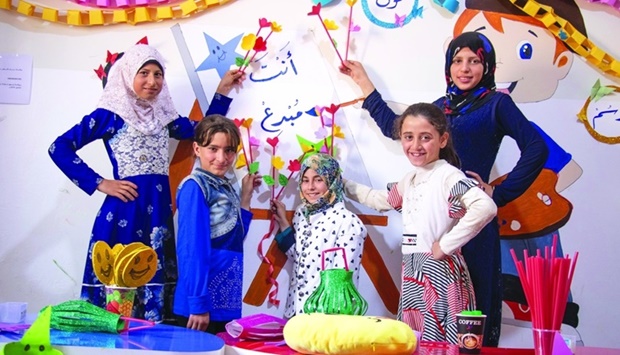The recreational activities, held by the centres for a group of children in the IDPs camps, aim to improve their psychological state, create an atmosphere of fun for them, and teach them purposeful games, through three teams visiting the camps daily, a statement explained Wednesday.

The child-friendly centres were selected based on the safety and security criteria defined by the child protection sub-sector, ensuring easy access for displaced children. Transportation was provided for all children, including children with special needs. The centres were renovated and decorated with cheerful drawings and colours, and provided with the necessary furniture such as tables, chairs, drawing and writing boards, and stationery.
QC provides regular and targeted psycho-social support services to 3,000 children directly, in addition to joint activities and interactive games. All the children are involved in the activities and their views are taken into account and discussed. The children acquire their skills and enhance their abilities to return to normal after experiencing the difficulties.
As the displacement created psychological pressure on caregivers, which led to a decline in their interest in their children, parenting skill sessions were designed to provide the caregivers with additional skills to deal with their children. These sessions were divided into 12 sessions targeting groups of caregivers according to the ‘I deal’ curriculum, which provides an integrated methodology focused on children and caregivers.
The case management activity targets children who have more weaknesses than their peers. Their case is evaluated first, then the service is provided to them. The case is followed up with complete confidentiality.
Emphasis is placed on directly providing logistical services to the child (such as hearing aids, eyeglasses, wheelchairs for children with disabilities, medical shoes, and others). As for services that require longer follow-up and greater specialisation, they are referred to specialised organisations.
Besides, the centres offer awareness sessions by specialised guides, benefiting nearly 800 children and adolescents.

The child-friendly centres were selected based on the safety and security criteria defined by the child protection sub-sector, ensuring easy access for displaced children. Transportation was provided for all children, including children with special needs. The centres were renovated and decorated with cheerful drawings and colours, and provided with the necessary furniture such as tables, chairs, drawing and writing boards, and stationery.
QC provides regular and targeted psycho-social support services to 3,000 children directly, in addition to joint activities and interactive games. All the children are involved in the activities and their views are taken into account and discussed. The children acquire their skills and enhance their abilities to return to normal after experiencing the difficulties.
As the displacement created psychological pressure on caregivers, which led to a decline in their interest in their children, parenting skill sessions were designed to provide the caregivers with additional skills to deal with their children. These sessions were divided into 12 sessions targeting groups of caregivers according to the ‘I deal’ curriculum, which provides an integrated methodology focused on children and caregivers.
The case management activity targets children who have more weaknesses than their peers. Their case is evaluated first, then the service is provided to them. The case is followed up with complete confidentiality.
Emphasis is placed on directly providing logistical services to the child (such as hearing aids, eyeglasses, wheelchairs for children with disabilities, medical shoes, and others). As for services that require longer follow-up and greater specialisation, they are referred to specialised organisations.
Besides, the centres offer awareness sessions by specialised guides, benefiting nearly 800 children and adolescents.

